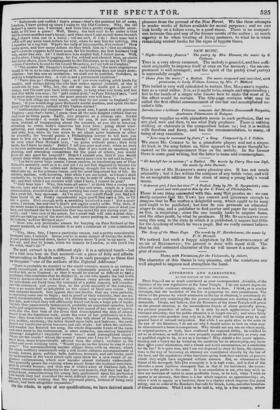NEW MUSIC.
" Night—blooming flowers." The poetry by Mrs. Hemans, the music by S.
Cadman.
THIS is a very clever canzonet. The melody is graceful, and has suffi- cient originality to impress itself at once on the memory ; the accom- paniment is well arranged ; and the spirit of the poetry (real poetry) is successfully caught.
" Hume frae the wars ;" a Ballad. The music compoied and inscribed, with
permission, to Lady William Lennox, by Mrs. P. Millard. This ballad is very well calculated to sustain Mrs. MILLAtin's reputa- tion as a vocal writer. It is, as it ought to be, simple and unpretending • but in the hands of a.singer who knows how to make the most of it, the effect would be certain. The title-page contains what may be called the first official announcement of our fair and accomplished vo- calist's title.
Introduzione e brillante Polonese, composta dal Maestro Emmanuel Borgatta, Academico Filarmunico di Bologna.
Germany supplies us with pianoforte music in such profusion, that we are glad, now and then, to see what Italy produces. There is tinthing striking or elaborate in the composition before us ; but it is written with freedom and fancy, and has the recommendation, to many, of being of easy execution.
" Love may be increased by fears;" a Song. Composed by J. L Cobbin. We guess Mr. COBBIN to be a pianoforte player; and not a singer. At least, in the song before us, there appears to be more thought be- stowed on the accompaniment than on the melody. In the former there is some good writing, but the latter is tame and commonplace.
"He has left her in sorrow ;" a Ballad. The Words by Harry Sloe van Dyk, the music by John Batmen.
This is one of Mr. BARNETT'S many pleasing airs. It has not much originality ; but it lies within the compass of any treble voice, and will be an acceptable addition to the stock of many a young lady's vocal. music.
" 0 dearest gikl, I love but thee .1" A Ballad. Sung by Mr. E. Spagnoletti ; corn-- , posed and dedicated to him by Jos. C. Taws, of Philadelphia. -There -is one thing connected .with this song that puzzles ns : we can easily conceive that Mr. TAWS has conceit and' ignorance enough to imagine that he as written.a delightful song, which ought to be sung• and ought to be publiSheli but how he can persuade an educated singer to sing, and a publisher to find pewter and paper for such trash. as this, is surprising ; since the one usually, looks to acquire fame, and the other profit, by what he produces. If Mr. SPAGNOLETTI ever sung this song in the state, in which it is published, it augurs but little• for the Academy of which he. was a pupil. But we really cannot believe- that he did.
The Song of the Music Fays. The words by If Bartholomew, tire music by F. H. Himmel.
We noticed last week a happy adaptation by Mr. BARTHOLOMEW: O' an air of BEETHOVEN; the present is done with equal skill. The, cheerful and animated Character of the air will insure it a certain de- gree of success.
Theme, with Variations, for the Violoncello, by Hubert.
The character of this theme is very pleasing, and the variations are well adapted to improve and strengthen the hand.


















 Previous page
Previous page